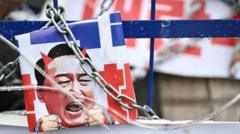In South Korea, the political landscape remains tumultuous as impeached President Yoon Suk Yeol stays defiant, barricaded within his fortified residence, as an arrest warrant related to his controversial martial law order approaches expiration. Yoon's security detail has taken extreme measures, including erecting barbed wire and utilizing buses to block any attempts by investigators to carry out the warrant, which comes amid a widespread public outcry.
The developments have heightened tensions in a country already on edge following Yoon's failed martial law order, which he justified by citing threats from North Korea and "anti-state forces." Public sentiment has sharply divided, with significant protests occurring over the weekend, both in support of and against Yoon, amidst heavy snowfall.
Despite multiple summons to appear for questioning regarding insurrection and abuse of power, Yoon has resisted, with investigators forced to abort a planned arrest after a tense standoff with his security service. Calls to the police to enforce the warrant have been made, but challenges regarding the legitimacy of Yoon's arrest have been presented by his defense team, which argues that anti-corruption investigators lack authority over such serious allegations.
Caught in this legal limbo, acting president Choi Sang-mok faces increasing pressure from opposition lawmakers demanding action against security personnel hindering the arrest. Amidst claims of "practically detaining" Yoon, the presidential security chief insists they are fulfilling their duty to protect the sitting president while navigating complex legal disputes.
The national crisis echoes into the broader geopolitical sphere as US Secretary of State Antony Blinken visits Seoul to reinforce trilateral ties with South Korea and Japan. Intriguingly, Yoon's martial law strategy was executed without informing the US, leaving American policymakers watching the unfolding chaos with concern.
With Yoon possibly facing further arrest and potential trials ahead, how the situation unfolds will not only shape South Korea's future political landscape but may also redefine its international alliances in a time when a shift towards new leadership could see changes in foreign policy direction. As the public remains divided and diplomatic relations loom uncertain, the resilience of South Korea's democratic institutions is being put to the test amidst this evolving crisis.


















